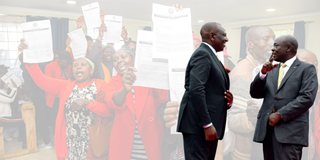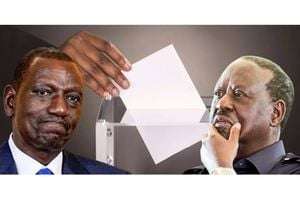
Despite initial support for Gachagua's impeachment, public sentiment largely reflected frustration with President Ruto's government and its performance.
The concluded public participation to seal the fate of the embattled Deputy President Rigathi Gachagua took an unprecedented twist after it turned into an audit and a referendum on the Kenya Kwanza administration.
Widespread calls for the impeachment of both President William Ruto and Mr Gachagua characterised the hearings in a major vote of no confidence that the proponents had not foreseen.
The feeling by many of those interviewed on Friday, October 4 and Saturday, October 5 is that the impeachment is more of a political fight between Dr Ruto and Mr Gachagua, with little to do with the plight of the masses.
Some of the issues raised included the pain patients face in accessing health care following the implementation of the new Social Health Insurance Fund (SHIF) as well as the new university funding model that has seen many students unable to afford higher education.
Buoyed by the overwhelming backing of 291 MPs in the National Assembly, allies of President Ruto had expected huge public endorsement, except in some parts of Mt Kenya thought to be the Deputy President’s stronghold, only to be met with a widespread backlash and a reminder that the administration has failed to deliver on the lofty promises it made in the run-up to the 2022 presidential election.
The sessions in the selected venues across the 47 counties unintentionally offered a platform for the disgruntled Kenyans to vent their frustrations, accusing President Ruto’s administration of warped priorities.
The hearings appeared to have offered a platform for a fresh agitation similar to the one staged by the Gen Zs that saw the president make major concessions, including the dissolution of the Cabinet and the withdrawal of the Finance Bill, 2024.
In Eldoret City, President Ruto’s home town, the public participation at the County Hall almost turned chaotic after two groups clashed sharply, with one supporting the impeachment and the other opposing it.
A section of residents in the hall started shouting that Gachagua must go while the other group shouted that even President Ruto must go, resulting in fierce verbal exchanges among the participants.
In Nakuru, residents organised a procession through the city, marching along Kenyatta Avenue while chanting slogans such as "No Gachagua, No Ruto," expressing their discontent with the current political climate.
"We voted them in as a pair, and now we wonder why they want to impeach the Deputy President and leave the President. If he is impeached, they are all going home. This public participation is just for formality; we do not believe in it," said Muthoni Moraya.
It was the same scenario in Kisumu when some were in agreement with the motion while others were completely against it, claiming that not only the deputy president should be impeached but should the motion sail through, then President William Ruto should also follow suit.
US-based university lecturer and political analyst, Prof David Monda, said the public opinion may not have much influence in the subsequent decision by both the National Assembly and the Senate. He said the fight between Dr Ruto and Mr Gachagua has got to a point where neither is willing to back down.
“I don't think the reaction can influence the Senate because the outcome on the DP was decided. It is a fait accompli. The outcome was already settled and this public participation has more to do with going through the motions than anything to influence a change in what has already been decided in the highest rungs of power,” said Prof Monda.
He noted that ironically, the public participation targeting Mr Gachagua has turned into a referendum on President Ruto's "administration and its maladministration."
“It has shown the broad public disaffection with the government on good governance, corruption, abductions/extrajudicial killings, and failed policy on health care, education, and the economy,” he said.
Mr Gachagua’s sympathisers on Saturday, October 5 said the public reaction is a clear rejection of the push to impeach the second-in-command.
They suggested that Dr Ruto and his allies have to rethink their impeachment push. However, some of President Ruto’s allies argued that some of the incidents were choreographed to create an image that Mr Gachagua enjoys support.
“This is a highly contested matter and it was expected that the aggrieved person would want to create some image to help his situation. Why couldn’t those opposed to the motion just sign the forms without causing chaos? It is because they don’t have the numbers, so the only way for them to be heard is by causing chaos,” said UDA Organising Secretary Vincent Kawaya, who is also the Mwala MP.
“Most of the chaos was witnessed at the county venues, but there were a lot happening at the constituency level where people turned up to sign the forms. They were interested in causing a scene that is why they planted people at the county venues to cause fracas and issue threats that even the President should be impeached,” said the MP.
But Machakos Deputy Governor Francis Mwangagi said the public's verdict had exposed MPs as appendages of the executive. He said MPs must decide whether they are representatives of the people or taking instructions from other quarters.
He warned that whatever the outcome of the impeachment, the country faces a volatile political environment, even as he appealed to the president to consider mending fences with his deputy.
“This exercise will leave the country more divided. The public has shown that it is dissatisfied with what is happening. The relationship between the President and the DP will not be the same,” he said.
Kitui Senator Enoch Wambua, an ally of Wiper leader Kalonzo Musyoka— who has declared support for Mr Gachagua — said the public is clear that the two should leave office for failing Kenyans.
“Kenyans have spoken loudly and clearly. If Gachagua is to go, he should go after Ruto. Period. I am hoping that nobody will try to manipulate the loud and clear voice of Kenya to return a different verdict. If anyone attempts that move, the public reaction will be grossly unforgiving,” said Mr Wambua.
Similar sentiments were echoed by Jubilee Secretary General Jeremiah Kioni, who said any attempt to ignore public opinion had the potential to spark a revolution. He said it was because of the behaviour of MPs taking instructions from other quarters that the youth invaded Parliament after the passage of the Finance Bill, 2024.
"This is a regime that cannot read the signs of the times. They came and underestimated the intelligence of Kenyans, but the people have now made it clear that the president, his deputy and parliament must go. William used all his time to disagree with Uhuru and now he is using all his time to get rid of his deputy Gachagua but Kenyans have said they all have to go," said Mr Kioni.









